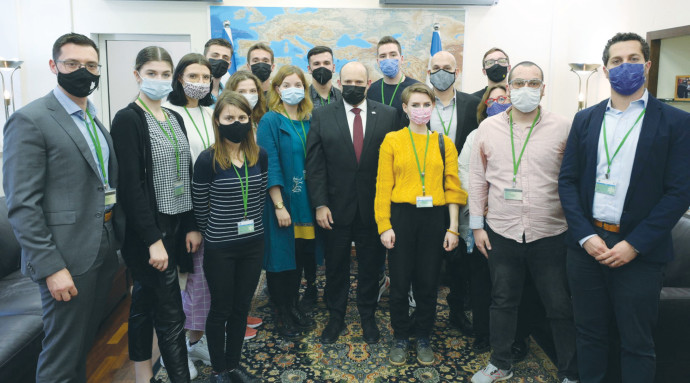Since its inception, Zionism’s central focus has been on the life that Jews could build in the place where our nation was born. The thriving and modern Israel of today – which is unrecognizable from the country that I grew up in during the 1980s – is increasingly broadening the nature of the Zionist dream.
Based on research conducted by Impact: NPO, a wide-ranging report recently released by Masa Israel Journey – where I serve as CEO – sheds light on a powerful trend: Just as global Jewish communities were vital in building a Jewish state during the 20th century, Israel will be vital for sustaining Jewish life outside of the country in the 21st century.
Masa offers young Jewish adults ages 16 to 35 the opportunity to participate in long-term, immersive programs in Israel where they can live like a local while working, studying, teaching, or volunteering on fellowships that range from a few months to a year in duration.
The report, based on an Impact: NPO survey of over 2,400 Jewish-American young adults, indicates that these programs are powerfully impactful for Fellows, and the Jewish communities to which they return as alumni.
Compared with their peers with similar backgrounds, Masa alumni are significantly more likely to live a deeply engaged Jewish life, be strongly connected to and advocate for Israel, and be devoted supporters of their local Jewish communities.

What’s perhaps most exciting is that the Masa experience is extraordinarily impactful on those young Jews who have been somewhat or totally disengaged from Jewish life before coming to the Jewish state.
The study provides a side-by-side analysis of three categories of young Jewish adults: those who experienced Israel like a local on long-term fellowships, those who attended short-term programs under one month, and those who have never been to Israel.
Long-term Masa alumni
LONG-TERM Masa alumni are more than twice as likely to say that being Jewish is an important part of their lives than individuals who have never been to Israel (80% vs. 36%). The numbers support a similar narrative regarding professional and career development.
Among full-time workers, one in five long-term Masa alumni works for a Jewish organization, four times the rate of short-term participants. Just imagine the impact on college students when they meet Jewish professionals who spent up to a year authentically living in Israel, especially on a campus with greater anti-Israel activity.
Such was the case with Charlene Green. Despite feeling disconnected from her Jewish roots before her long-term Israel program, she made it her mission to nurture the “part of my Jewish soul that blossomed in Israel.”
Now, as director of Changemaker Growth and Experience at the Jewish Federations of North America, Green plays a vital role in cultivating the Jewish community for millions. She attributes her lifelong work as a Jewish professional to her long-term Masa program.
The effect long-term immersive programs have on the Jewish nonprofit and educational world tells a bigger story. Masa alumni are confident, eager to grow, and proud of their Jewish identities. Amy Herman joined a Masa leadership summit at age 21 and is now in a senior management role at a technology company.
Individuals like Herman are part of the 40% of long-term alumni who believe others would very likely describe them as leaders, a figure which jumps to 52% for those who regularly participated in Masa Leadership Summits.
Hundreds of Masa Fellows are selected each year to participate in these summits to develop their leadership capabilities through plenaries, group activities and workshops – one of the many ways Masa invests in the future of Jewish leadership. Overall, 72% of Masa alumni strongly believe their programs helped them grow as individuals.
Immersive Programming
IMMERSIVE PROGRAMMING also dispels common misconceptions that Israel is a burden on the Jewish community. While Israel is viewed as a divisive topic in many Jewish communities in North America today, our data shows that it doesn’t have to be this way. Long-term programs actually encourage greater support for Israel and deeper connections to Israelis and Jews around the world.
Most Masa alumni follow news about Israel in the media, with two-thirds strongly agreeing that they are concerned about growing anti-Israel sentiments in the US.
Fewer than half of respondents from the no-trip group said the same – just 25% and 38%, respectively. Masa alumni are also more comfortable sharing their opinions about Israel than their no-trip peers (42% vs. 28%) and are far more likely to strongly agree that Israel influences their Jewish identity (55% vs. 19%).
After being surrounded by Israelis at work, school and in their daily lives, 59% of Masa alumni strongly agree that they feel a strong connection to the Israeli people. More than just a fondness for the land, the forces that bind them with Israel are based on personal connections. They are deep, long-lasting and highly influential on behavior.
Armed with the tools for a lifetime of impact, Masa alumni also represent the future of Jewish philanthropy.
Randomly select any Masa alum, and there’s a good chance they regularly donate to Jewish-related charities or causes – 45% to be exact. To put this to proper scale, there are potentially tens of thousands of Fellows- turned-philanthropists whose patronage within the Jewish world is a direct result of Israel immersion.
With high rates of philanthropy, Jewish communal involvement, Israeli advocacy and leadership, Masa alumni become essential parts of the Jewish world after their long-term programs. I’ve long believed in the power of Israel to be a transformative tool for Jewish engagement.
Not only does this new data bring statistical backing to this belief, but it goes much further – showing that Israel is essential to sustaining global Jewry and securing a strong Jewish future.
The writer is the chief executive officer of Masa Israel Journey.
